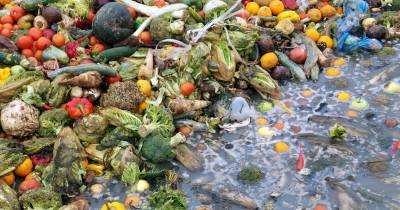NEW DELHI, 7 November 2024: Food waste is a significant issue in India, with millions of tons of food being wasted every year due to inefficiencies in the food supply chain. This not only represents a loss of valuable resources but also exacerbates food insecurity in a country where millions still suffer from hunger and malnutrition.
Fortunately, technology is playing a pivotal role in combating food waste by streamlining supply chain processes, improving storage and transportation, and connecting producers with consumers more effectively.
The Scope of Food Waste in India
India ranks as one of the world's largest food producers, yet it also faces immense food wastage. According to estimates by the Food and Agriculture Organization (FAO), approximately 40% of the food produced in India is wasted annually. This waste occurs at various stages of the supply chain, from production and post-harvest handling to processing, distribution, and consumption.
Key Areas Where Technology is Making an Impact
- Enhanced Crop Monitoring and Yield Prediction
Advancements in agricultural technology are enabling farmers to monitor crop health and predict yields more accurately. Using satellite imagery, drones, and sensors, farmers can gather real-time data on soil health, moisture levels, and crop conditions. This information helps in making informed decisions about irrigation, fertilization, and pest control, thereby reducing crop losses.
- Improved Harvesting Techniques
Technology is also improving harvesting techniques, ensuring that crops are picked at the optimal time to minimize waste. Automated harvesting machines and smart harvesting tools can reduce the labor-intensive nature of harvesting, increase efficiency, and ensure that crops are harvested and processed quickly to prevent spoilage.
- Cold Chain Solutions
A significant portion of food waste in India is due to inadequate cold storage and transportation facilities. Innovative cold chain solutions, such as solar-powered refrigeration units and IoT-enabled cold storage systems, are helping to maintain the quality of perishable goods from farm to fork. These technologies monitor temperature and humidity in real-time, ensuring that produce remains fresh during transportation and storage.
- Supply Chain Management Platforms
Digital supply chain management platforms are connecting farmers directly with buyers, reducing the number of intermediaries and streamlining the supply chain. Startups like Ninjacart and DeHaat are using technology to create efficient market linkages, enabling farmers to sell their produce directly to retailers, restaurants, and consumers. This not only reduces food waste but also ensures fair prices for farmers.
- Blockchain for Traceability
Blockchain technology is being used to improve traceability and transparency in the food supply chain. By providing a secure and immutable record of transactions, blockchain ensures that every step of the supply chain is documented. This helps in tracking the origin and movement of food products, reducing fraud, and ensuring that food safety standards are met. Enhanced traceability also allows for quicker responses to food safety issues, minimizing waste due to recalls.
- Food Processing Innovations
Innovations in food processing technology are helping to extend the shelf life of products and reduce waste. Techniques such as vacuum packing, freeze-drying, and high-pressure processing preserve the nutritional quality of food while extending its shelf life. Additionally, technology is being used to convert food waste into valuable by-products, such as biofuels, animal feed, and compost.
- E-commerce and Food Delivery Apps
E-commerce platforms and food delivery apps are playing a significant role in reducing food waste at the consumer level. Companies like BigBasket and Zomato are using technology to optimize inventory management, ensuring that food is sourced and distributed efficiently. Some apps also offer discounts on surplus food, encouraging consumers to purchase food that would otherwise go to waste.
- Artificial Intelligence and Machine Learning
Artificial intelligence (AI) and machine learning (ML) are being leveraged to predict demand and optimize inventory management. By analyzing historical data and current trends, AI and ML algorithms can forecast demand more accurately, reducing overproduction and ensuring that food supply matches demand. These technologies are also being used to identify inefficiencies in the supply chain and suggest improvements.
Success Stories and Initiatives
- Ecozen Solutions
Ecozen Solutions, an agritech startup, has developed solar-powered cold storage units that help farmers store their produce in optimal conditions without relying on grid electricity. This innovation is particularly beneficial in rural areas with unreliable power supply, reducing post-harvest losses and extending the shelf life of perishable goods.
- Stellapps
Stellapps, a dairy technology startup, uses IoT and data analytics to enhance the dairy supply chain. Their solutions monitor milk quality and temperature throughout the supply chain, ensuring that dairy products remain fresh from farm to consumer. This has significantly reduced milk spoilage and wastage.
- AgriBazaar
AgriBazaar is an online platform that connects farmers with buyers, streamlining the sale of agricultural produce. By eliminating middlemen and providing a direct market for farmers, AgriBazaar reduces the time food spends in the supply chain, minimizing spoilage and waste.
Challenges and Future Prospects
While technology offers promising solutions to reduce food waste, several challenges remain:
- Access to Technology
Small-scale and marginal farmers may have limited access to advanced technologies due to high costs and lack of technical expertise. Government support and subsidized programs can help bridge this gap.
- Infrastructure Development
Improving rural infrastructure, including roads, electricity, and internet connectivity, is crucial for the widespread adoption of technology in agriculture.
- Awareness and Training
Educating farmers about the benefits of technology and providing training on how to use these tools effectively is essential for successful implementation.
Technology is revolutionizing the Indian food supply chain, offering innovative solutions to reduce food waste and improve efficiency. From enhanced crop monitoring and cold chain solutions to blockchain traceability and AI-driven demand forecasting, these advancements are empowering farmers, optimizing supply chains, and ensuring that more food reaches consumers.
While challenges remain, continued investment in technology and infrastructure, coupled with government support and farmer education, can drive significant progress in combating food waste and enhancing food security in India.
Image credit: Pinterest























